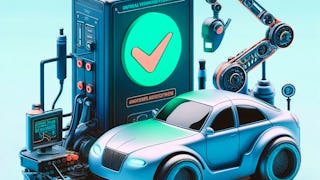This course will explain the core structure in any autonomous system which includes sensors, actuators, and potentially communication networks. Then, it will cover different formal modeling frameworks used for autonomous systems including state-space representations (difference or differential equations), timed automata, hybrid automata, and in general transition systems. It will describe solutions and behaviors of systems and different interconnections between systems.



Modeling of Autonomous Systems
This course is part of Foundations of Autonomous Systems Specialization

Instructor: Majid Zamani
1,676 already enrolled
Included with 
(11 reviews)
Recommended experience
What you'll learn
Model basic autonomous systems including linear control systems, sequential circuits, and simple timed automata in a unified fashion
Describe solutions and behaviors of systems
Define and illustrate interconnections between system
Details to know

Add to your LinkedIn profile
6 assignments
See how employees at top companies are mastering in-demand skills

Build your subject-matter expertise
- Learn new concepts from industry experts
- Gain a foundational understanding of a subject or tool
- Develop job-relevant skills with hands-on projects
- Earn a shareable career certificate


Earn a career certificate
Add this credential to your LinkedIn profile, resume, or CV
Share it on social media and in your performance review

There are 4 modules in this course
In this introductory module, we delve into the world of autonomous and cyber-physical systems, their significance, structure, and applications. By studying real-world examples, such as the Ariane 5 rocket failure, adaptive cruise control, and self-driving cars, we will grasp the foundational understanding of the importance of modeling in autonomous systems. Moreover, we'll discuss key components of these systems, the tight interaction between hardware and software, and the ubiquity of autonomous systems in various sectors.
What's included
3 videos8 readings
In Module 2, we delve into the nuances of system modeling. Through instructional videos, students grapple with system definitions, state diagrams, and transition systems. Relevant assignments further solidify this knowledge. Real-world examples, like the Northeast Blackout of 2003, underscore the importance of precise modeling, while practical systems such as a Beverage Vending Machine and Turnstile illustrate core concepts. A truly academic journey into the essence of system modeling awaits.
What's included
3 videos1 reading2 assignments
Module 3 introduces students to the fundamental principles of modeling dynamic systems, focusing on translational mechanical systems, rotational mechanical systems, and analog circuits. Emphasizing the mathematical relationships underlying these systems, the course progresses into more specific examples and dives deep into timed and hybrid automata, providing a comprehensive understanding of the role of timing in systems modeling.
What's included
9 videos1 reading2 assignments
Module 4 dives deep into understanding system solutions, behaviors, and various compositions. Learners will be introduced to the mathematical representations of systems and their behaviors. Through a series of engaging video content, learners will explore parallel, serial, and feedback compositions. Additionally, the module provides practical assignments to enhance comprehension and a detailed study of system modeling.
What's included
4 videos1 reading2 assignments
Instructor

Offered by
Explore more from Design and Product


University of Colorado Boulder


University of Colorado Boulder


University of Colorado Boulder


University of Colorado Boulder
Build toward a degree
Why people choose Coursera for their career




New to Design and Product? Start here.

Open new doors with Coursera Plus
Unlimited access to 10,000+ world-class courses, hands-on projects, and job-ready certificate programs - all included in your subscription
Advance your career with an online degree
Earn a degree from world-class universities - 100% online
Join over 3,400 global companies that choose Coursera for Business
Upskill your employees to excel in the digital economy
Frequently asked questions
Access to lectures and assignments depends on your type of enrollment. If you take a course in audit mode, you will be able to see most course materials for free. To access graded assignments and to earn a Certificate, you will need to purchase the Certificate experience, during or after your audit. If you don't see the audit option:
The course may not offer an audit option. You can try a Free Trial instead, or apply for Financial Aid.
The course may offer 'Full Course, No Certificate' instead. This option lets you see all course materials, submit required assessments, and get a final grade. This also means that you will not be able to purchase a Certificate experience.
When you enroll in the course, you get access to all of the courses in the Specialization, and you earn a certificate when you complete the work. Your electronic Certificate will be added to your Accomplishments page - from there, you can print your Certificate or add it to your LinkedIn profile. If you only want to read and view the course content, you can audit the course for free.
If you subscribed, you get a 7-day free trial during which you can cancel at no penalty. After that, we don’t give refunds, but you can cancel your subscription at any time. See our full refund policy.
More questions
Financial aid available,


